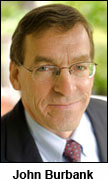OPINION
Class of 2014 has lived through real world lesson in economics
By JOHN BURBANK
 (June 19, 2014) — Last week I got to watch the seniors at Ballard High School graduate into the next phase of their lives. They were happy. They had more than just made it through their childhoods. Some graduates had learned differential equations. Some, perhaps almost all, now know how to write essays. Some students specialized in making top-rate videos. Others realized that knowing history is important. Whether they are good at arts, music, track, poetry, physics, journalism, or just being with their friends, students and colleagues, they have now joined the adult world, optimistic, fearful, and unknowing about the future.
(June 19, 2014) — Last week I got to watch the seniors at Ballard High School graduate into the next phase of their lives. They were happy. They had more than just made it through their childhoods. Some graduates had learned differential equations. Some, perhaps almost all, now know how to write essays. Some students specialized in making top-rate videos. Others realized that knowing history is important. Whether they are good at arts, music, track, poetry, physics, journalism, or just being with their friends, students and colleagues, they have now joined the adult world, optimistic, fearful, and unknowing about the future.
The class of 2014 has already lived through an economic and political rollercoaster. Born in 1996, their first few years were in a country in which optimism was literally bubbling up. Wages were rising, the Internet economy was taking off, the federal government was running a budget surplus, taxes on the wealthy had been pushed up a little in 1993, and everyone was benefitting. That happy period lasted for about four years.
Then the Supreme Court picked George Bush as president, contrary to the popular vote. At the same time, the Internet bubble burst, and the economy went into a tailspin. George Bush’s answer was to cut taxes on the wealthiest Americans. In our state, public revenue dropped as fewer homes were built, consumer spending dropped, and businesses cut jobs. In 2004 our state spent $1 billion less on public services than it did in 2002. $300 million was taken out of K-12 education, even as the number of kids in school was growing by the thousands Another $300 million was taken out of higher education. The University of Washington pushed tuition up 20 percent, adding another $1,000 to the cost, at the same time that middle class wages and family incomes flattened out.
The 9/11 attacks on the World Trade Center brought us together, in sadness and in solidarity. But instead of building a community of hope, George Bush told us to “go shopping,” even if we had less money, and led us, with false pretenses, into the quagmire of the war in Iraq, while cutting taxes on the wealthy even more.
Then came the housing boom, built on an expectation that housing prices would continue to go up and up and up. Banks pushed home loans onto anyone who would bite. We know where that ended up. Washington Mutual, one of the major perpetrators of dishonest home lending, is a relic of history. The housing market fell apart, the financial instruments based on these loans turned out to be close to worthless, consumer confidence fell, businesses laid off workers, and the banks laughed all the way to the bank with their federal bailouts. We entered the Great Recession, and outside of the metropolitan corridor, we are still in it.
What did the Class of 2014 take away from this? They saw their own parents laid off of work and having a hard time getting another job. They saw their education shrink, as in three years the state cut over $2,200 in support for every single K-12 student in the state. They saw their own future recede. When they were in middle school they could expect their tuition at the University of Washington to be $7,000. When they started high school in the fall of 2010, tuition was over $9,000. If they start at the University this September, their tuition will be $12,800.
But the graduates of Ballard High School, and all the other high school graduates in the state, know this. And they remain optimistic, enthusiastic, and wondering … wondering what the future portends for them, and how they can make a future for themselves. They have been through the worst cycles of our economy. They live in the results of a culture that endorsed selfishness and greed. They want to make sure that is the past, not the future. If they succeed, this will be good for our kids and our kids’ kids. And it will be good for us. Thank you in advance to the class of 2014. You are your brother’s keeper.
 John Burbank is the executive director and founder of the Economic Opportunity Institute in Seattle. John can be reached at john@eoionline.org.
John Burbank is the executive director and founder of the Economic Opportunity Institute in Seattle. John can be reached at john@eoionline.org.





